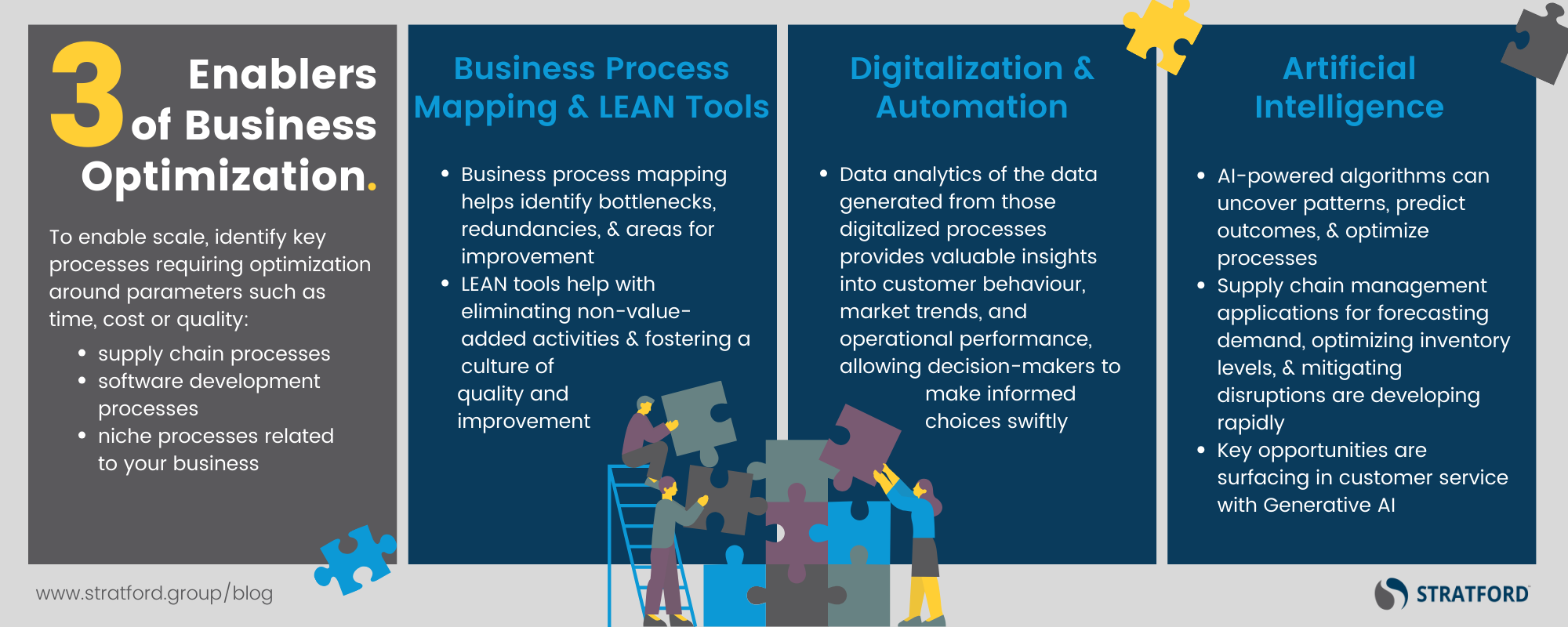Business process optimization is crucial for organizations aiming to grow and become more competitive. This involves understanding and redesigning processes to enhance efficiency and quality, applying technology like automation and digitalization, and leveraging Artificial Intelligence (AI) to predict outcomes and improve operations. The blog explores how tools such as business process mapping, LEAN methodologies, and emerging AI technologies play a vital role in this endeavour, helping businesses to streamline operations and deliver greater value to their customers.
Many of our clients are on a path to growth and find that with growth, business process complexity can increase surprisingly quickly. Without deliberate design of processes, organizations can start to trip over their increasing size. Often, to enable scale and as driven by strategic objectives, our clients identify key processes which require optimization around parameters such as time, cost or quality. Those can range from supply chain processes to software development processes or niche processes related to their business. In this blog, we delve into three enablers of business optimization, some established and others are emerging: business process mapping and LEAN tools, digitalization and automation, and the role of Artificial Intelligence (AI) including machine learning and generative AI.

1. Business Process Mapping and LEAN Tools
At the heart of any optimization endeavour is the understanding of existing processes. This is decades old practice remains relevant especially when business processes are not documented and therefore not entirely visible. Business process mapping, a visual representation of a company's workflows, helps identify bottlenecks, redundancies, and areas for improvement. This technique serves as a foundational step in the quest for efficiency.
LEAN methodology, with its focus on eliminating “waste” such as wait time, over-processing, or errors, is a go-to tool for continuous improvement. LEAN tools such as value stream mapping and Kaizen (continuous improvement) drive operational excellence by eliminating non-value-added activities and fostering a culture of quality and improvement.
By systematically analyzing processes and applying LEAN principles, organizations can streamline operations, enhance productivity, and ultimately deliver greater value to customers.
2. Applying Technology to Business Optimization
Today, there are hardly any processes that do not involve technology. While examining business process optimization with our clients we find that it is important to apply a technology lens. An understanding of the “art of the possible” from a technology perspective opens the door for increased automation and digitalization, which is a must in our data-driven world. Our clients often find value in applying both a business and technology lens when optimizing processes, whether those tools are well established, such as ERP, or are in specialized domains unique to them. This often leads to structured exercises in the selection of commercial off-the-shelf technologies (COTS) to meet business needs. There is significant availability of COTS systems, which are becoming increasingly easily configurable for a range of common business processes as well as niche industry applications.
Data analytics of the data generated from those digitalized processes provides valuable insights into customer behaviour, market trends, and operational performance, allowing decision-makers to make informed choices swiftly.
3. The Role of AI in Business Optimization
Artificial Intelligence (AI) represents the biggest potential for business optimization, promising unprecedented levels of efficiency, innovation, and agility. We always advise clients to have a strategic and value driven approach to choosing the domains where they will first invest in AI. In other words, it is important to define the desired benefits for AI investments and the type of business opportunities to tackle. In the domain business process optimization AI will be useful through predictive data models and automation.
AI-powered algorithms can uncover patterns, predict outcomes, and potentially optimize processes, especially in the presence of large data sets. One such example is predictive maintenance to minimize downtime by anticipating equipment failures before they occur. Supply chain management applications for forecasting demand, optimizing inventory levels, and mitigating disruptions are developing rapidly. Also, with generative AI, key opportunities are surfacing in the realm of customer service. AI-driven chatbots can reduce response time and have improving capabilities which can improve customer experience. Those generative AI capabilities can now be increasingly seen at doctor’s offices supporting clinicians with time-consuming documentation.
Overall, our observation is that business process optimization continues to be an important component of many business strategies where organizations need to become more competitive, deliver better customer experience, become faster or more cost effective. The path to optimized business processes will often involve a robust understanding of the business process, digitalization and, where possible, automation of this business process and the exploration and implementation of AI tools to achieve better processes.
